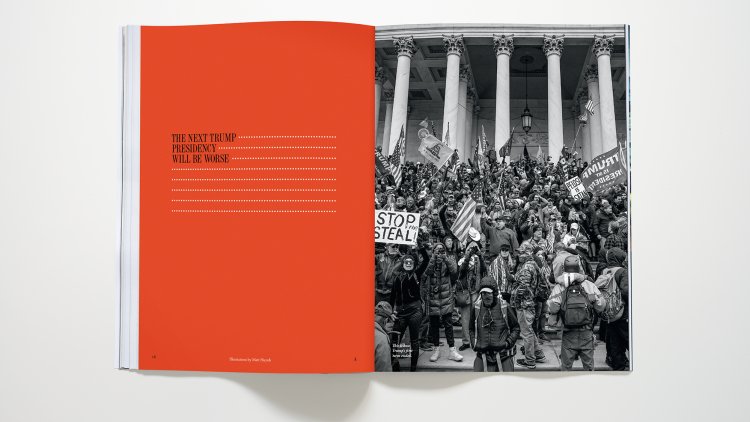Stop Trying to Understand Trump Voters as if They Are Aliens
Readers respond to our January/February 2024 issue.

If Trump Wins
In The Atlantic’s January/February issue, 24 contributors considered what Donald Trump could do if he were to return to the White House.
The Atlantic’s January/February issue performs a valuable service by raising the country’s awareness of what’s in store should Donald Trump be reelected president. In the same way, the United States ought to understand how reelecting Joe Biden might benefit Americans and improve world security. We also need to learn about the inner workings of the Biden administration, its future policies and programs, and how another four years could affect the quality of American lives.
Todd Everett
Healdsburg, Calif.
Although the various articles in the “If Trump Wins” issue may have been accurate, I fear they didn’t go far enough in analyzing the real problem: the Republican Party. Few of Donald Trump’s successes as president could have been accomplished without the full support of nearly the entire GOP. Few of Trump’s second-term goals will be realized without full Republican support. The United States doesn’t have a Trump problem; it has a Republican problem. He is merely the latest and perhaps most powerful Republican voice calling for the end of the modern federal government, a position favored by many Republicans since President Ronald Reagan and Grover Norquist. The assaults on government, civil rights, and democratic norms that this issue so ably describes will continue with or without Trump as long as modern Republicans control any levers of government.
Catherine Whiting
Kensington, Md.
As experts in the fields of poverty and social policy, we were saddened that The Atlantic’s January/February issue ignored the damage Donald Trump would do to the social safety net if he were to regain the White House. As the 2024 campaign season ramps up, it is crucial that poverty and the safety net receive sufficient attention.
Throughout Trump’s administration, we led a working group documenting the myriad ways that Trump and the GOP sought to weaken, retrench, and dismantle essential programs such as Medicaid and SNAP. Trump’s efforts largely took place without public scrutiny, relying on changes to byzantine bureaucratic procedures and not congressional debates or policy discussions. He even sought to alter how the federal government measured poverty to kick hundreds of thousands of recipients off federal anti-poverty programs or reduce their already meager benefits.
The safety net grew during the early days of the pandemic in an effort to protect America’s most vulnerable citizens. But these programs were largely temporary, and the safety net has unfortunately returned to its paltry, pre-pandemic status. Even with a Democrat in the White House, the safety net doesn’t receive the attention or focus necessary to ensure that Americans are adequately protected. But if Trump is given another term, he would continue his full-scale war on the nation’s poor. We know what he can do, and what he will do.
Ryan LaRochelle
Senior Lecturer, University of Maine
Orono, Maine
Luisa S. Deprez
Professor Emerita, University of Southern Maine
Portland, Maine
Why do articles like Mark Leibovich’s “This Is Who We Are,” which subtly derides Trump voters, seem to outnumber the articles explaining why people voted for Donald Trump? I live in a rural area, and I didn’t vote for Trump—but I know many good people who did. I understand that the current system really doesn’t work for them, and that they want things to change, much like the people who voted for Bernie Sanders and for Ross Perot before that. Why, for example, has wage growth stagnated since the early 1970s, while productivity has risen? For the sake of the country, The Atlantic should avoid articles like Leibovich’s and focus on the real issues.
Robby Porter
Adamant, Vt.
Mark Leibovich’s article, “This Is Who We Are,” reveals an important truth, but I wish he’d gone even further. Trying to “understand” Trump voters is a pointless exercise.
I consider myself a political independent. Many of my family members voted for Donald Trump in 2016. I couldn’t see why Trump’s insulting comments about women and Senator John McCain weren’t disqualifying for them, as they were for me, so I started engaging with my father, a college buddy of his from Ohio, and an uncle via email. What I learned from 2016 through 2020 was concerning. Most of their information came from nasty and transparently manipulative chain emails that put down “libs,” vilified Nancy Pelosi, laughed off climate change. I wondered why my relatives—smart, successful people—found these emails useful. Naively, I started fact-checking them. But as Megan Garber observes in this issue, the truth doesn’t matter. Once, I made the mistake of replying to everyone copied on the chain. I learned then of Trump supporters’ group psychology—they will defend one another no matter what, ganging up on anyone not going along with their line.
Later, as fires burned on three sides of my California home, I emailed my father a basic primer on climate-change science. I remember taking time to find the best resources: short, factual, based on information from the National Oceanic and Atmospheric Administration and NASA. In response, he notified my family that he was never speaking to me again. He died of a heart attack in 2020. When I broke the news of my father’s death to my uncle, one of his first reactions was to say that he was sorry I had decided to send that “disrespectful” climate-change email, implying that I had deserved to be ostracized.
I sent my father that email out of respect for him. He was an intelligent man. We had engaged in many thoughtful political discussions over a lifetime. The error I made was appealing to that intelligence post-Trump. After a steady diet of cynical half-truths and lies from chain emails and Fox News, my father could no longer absorb counterfactuals dispassionately; he saw them as attacks.
That was the end of my efforts to understand Team Trump’s perspective. The media, too, need to stop trying to understand Trump voters as if they are aliens. They are our family members. Like us, they are human, with all the human susceptibilities. It isn’t condescending to call them out.
Louise Yarnall
La Selva Beach, Calif.
Reading “If Trump Wins” was, in a word, exhausting. I came away thinking two things. First, the Democratic Party needs to get better at messaging, as was put best by Helen Lewis in her article, “The Left Can’t Afford to Go Mad.” Second, all of this just underscores the absurdity of the Electoral College. That Donald Trump—or anyone—doesn’t have to win the most votes to be “elected” and that everything detailed in the issue could possibly come to pass even though a plurality of the country might vote against it is Kafkaesque.
Ramsey Chilwell
San Francisco, Calif.
Behind the Cover
In this month’s cover story, Franklin Foer writes about the end of what he calls the “Golden Age of American Jewry.” Rising anti-Semitism, on the right and the left, threatens to undermine an unprecedented period of safety and prosperity for Jewish Americans—and it could in turn destroy the liberal order they helped establish.
For our cover design, we drew inspiration from the aesthetic traditions of Yiddish-theater posters, adapting their colors, typefaces, photo treatments, and intermingled languages. (Special thanks to David Roskies at the Jewish Theological Seminary for his Yiddish expertise.) From the mid-19th century through the outbreak of World War II, Yiddish theater companies flourished across Central and Eastern Europe, as well as in London, Paris, and New York. For Jewish immigrants to the United States, the critic Jesse Green has written, Yiddish theater offered “a keepsake of home, and yet also a means of acculturation.” Their comedies, dramas, and melodramas explored communal and cultural concerns but also looked outward, taking up the stories of Jews in America.
On the cover, we sought to assemble a cast of icons from the Jewish Golden Age. Along the top row, from left to right, are Saul Bellow, Bob Dylan, Susan Sontag, Leonard Nimoy, Henry Winkler, and Betty Friedan. In the center is Barbra Streisand, surrounded, clockwise from the top right, by Lenny Bruce, Ruth Westheimer, Steven Spielberg, Adam Sandler, Jonas Salk, Gilda Radner, Winona Ryder, Ralph Lauren, and Philip Roth. Along the bottom row, from left to right, are Ruth Bader Ginsburg, Jerry Seinfeld, Abraham Joshua Heschel, Louis Brandeis, and Cynthia Ozick.
— Peter Mendelsund, Creative Director
This article appears in the April 2024 print edition with the headline “The Commons.”
What's Your Reaction?




















